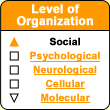|
|

The
“God” of Apple and His Disciples
People who do not live according to the precepts of a religion are either atheists or agnostics. An atheist is someone who does not believe in God and actually rejects the belief that God exists. An agnostic simply contends that we cannot know whether God exists. This is a form of skepticism regarding any supernatural phenomenon, based on the idea that only the natural world is accessible
to human knowledge. |
|
|
| RELIGIONS: HELPFUL TRANQUILIZERS, OR OPIATE OF THE PEOPLE? |
|
There is one major potential source
of anxiety for all human beings, and that is the certainty that
we are going to die. There are many reasons that we may fear
death—for
example, because it goes against our survival instincts, or
because of the physical or psychological suffering that may precede
it, or because we don't know what comes after it.
 |
|
Throughout history, human
cultures have tried to find some way to deal with this
mixed blessing of the awareness of our own mortality, to
exorcise it, to give it some meaning in order to make life
more bearable.
In ancient Greece, various philosophers ascribed very different
meanings to the fact of death. Plato firmly believed that when
the body perished, the soul survived. In contrast, Epicurus held
that there was no reason to fear death, because so long as
we exist, death does not, and once death comes, we exist no
longer. With death, all things cease, and hence there is no
point in being afraid. |
Seneca and the Stoics regarded life as a preparation for the hereafter.
A good many religions subsequently adopted this view, according
to which, after death, an infinitely good God awaits us in eternal
joy.
In the 19th century, this vision of life was harshly criticized by Karl Marx,
who described religion as the “opiate of the people”. In other words,
he believed that all religions put people's minds to sleep by hypnotizing them
with the illusion of a future paradise, thereby preventing the oppressed social
classes from uniting to struggle against those who keep them in misery.
| Even today,
religions still play a significant role in maintaining social
cohesion—indeed, the word “religion”
probably comes from one of two Latin words: relegere (to
bring together) or religare (to bind together again).
But this does not mean that religions are no longer divided
by the sectarianism
and disputes over dogma that have marked them throughout
history. |
|
  |
|
|







